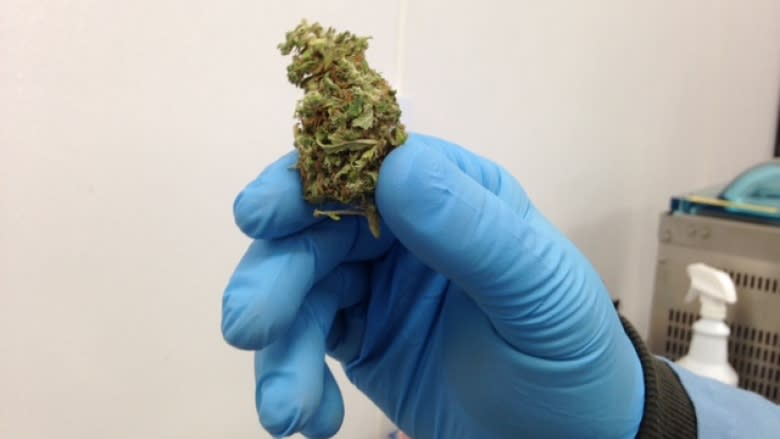Medical marijuana users could help researchers define risks, benefits
The number of Canadians authorized to use medical marijuana has skyrocketed, even as medical experts warn that not enough is known about its risks and benefits. Now, some are calling for researchers to tap into that growing pool of users to help answer some of those questions.
In 2002, a year after the government first permitted access to therapeutic cannabis through Health Canada regulations, 500 patients had registered. Today, there are more than 50,000.
This has happened despite the official position of the Canadian Medical Association (CMA), which says that "there is insufficient scientific evidence available to support the use of marijuana for clinical purposes."
The CMA says not enough is known about the effects of medical marijuana, the interactions between pot and other medications, or how to prescribe an appropriate dosage. It advises doctors they are not obligated to write cannabis prescriptions for patients.
That is causing frustration for some people with medical conditions who want the option of using medical marijuana rather than other types of prescription drugs.
"It was very difficult to get my prescription," said Jennawae McLean, who uses medical marijuana for chronic pain due to arthritis. "A doctor was willing to prescribe me Percocets and Humira and Lyrica and different pills like this, but they weren't willing to prescribe cannabis … which has no recorded deaths, no overdoses, no negative long-term side effects. It just doesn't make sense."
A 2014 poll conducted by Angus Reid Global showed that 59 per cent of Canadians support the legalization of marijuana. However, the Conservative government is opposed to legalization beyond medicinal uses.
Government guidelines for the medicinal use of pot are outlined in Health Canada's Marihuana for Medical Purposes Regulations (MMPR) and state clearly that prescriptions may be written only by a physician or nurse-practitioner; that medical marijuana must be purchased through a licensed producer, and only as dried plant material; and that it cannot be sold through a storefront or retail outlets.
Thousands of Canadians are flouting those regulations, and nowhere more than in British Columbia. There are now more medical marijuana shops in Vancouver than there are Tim Hortons - and more shops than in the rest of Canada combined. These stores are selling cannabis and hashish with names such as Purple Kush, West Coast Rockstar, Polar Hash and even Barbara Bud, in addition to a variety of edible marijuana products. On-site naturopaths provide medical marijuana access cards, in some cases to those who simply say they are feeling stressed.
Vancouver police are enforcing a prohibition on selling marijuana to minors; however they focus their criminal enforcement efforts on the trafficking of more serious street drugs, such as cocaine, heroin and methamphetamines.
Vancouver city councillor Kerry Jang said that, based on what has happened in Vancouver, he believes Canada already has defacto legalization of marijuana. "And quite frankly, I'm glad it's above ground in a dispensary, where we can regulate and see what's going on, rather than underground."
Now some are saying that studying this growing base of medical marijuana users could be the way for the medical community to fill gaps in our understanding of its risks and benefits.
Researchers have published thousands of peer-reviewed articles about medical marijuana, mainly on the therapeutic properties of the various cannabinoids found in cannabis plants. But "when you narrow the search down to clinical trials, the number drops dramatically," said Dr. Mark Ware, executive director of the Canadian Consortium for the Investigation of Cannabinoids.
"If you think about conventional pharmaceutical drug development, there is usually a company behind a new drug that's investing hundreds of millions of dollars in doing those clinical trials in order to make a claim that this drug, at this dose, is effective in the treatment of this symptom, in this disorder," said Dr. Ware, who is also the director of clinical research at the Alan Edwards Pain Management Unit at the McGill University Health Centre.
After government approvals, a conventional pharmaceutical drug is launched on the market and the company recuperates its investment. The problem, Dr. Ware says, is that "there isn't such an interest in investing in that work for herbal cannabis, which is something you can grow in your backyard."
Most of the research into the effectiveness of medical marijuana so far has focused on pain management. However, patients are using it for a variety of conditions ranging from Crohn's disease to chronic seizures.
Dr. Ware says the medical community would benefit from "real world evidence," which could be gathered by monitoring the progress of the thousands of patients who are using therapeutic marijuana.
Meanwhile, patients who want legitimate access to medical marijuana are caught between the government regulations and doctors who don't feel they have enough information about it to provide a prescription. And most doctors who are willing to write marijuana prescriptions do not endorse smoking the drug, recommending instead that patients use it in a way that will not be potentially harmful to their lungs. This may include edibles, oils, tinctures or topical medicines, none of which may be sold legally under current federal rules.
Vancouver resident Owen Smith has challenged that law all the way to the Supreme Court of Canada. It heard arguments on March 20 and has reserved judgment in the case. It can take at least six or seven months for the Court to publish its decision, which will be near the date of the next federal election, Oct. 19.
On The Sunday Edition this week
On CBC Radio's The Sunday Edition, starting at 9 a.m. ET March 29:
Our Passwords, Ourselves: These days we are ruled by passwords. They give us access to the world through our phones, laptops, bank machines and credit cards. And that may not be such a good thing, writes Michael Enright.
A life on hold - a Kate Wiley documentary: Shelly and Fred Muntau of Vancouver adopted an orphaned child from the Democratic Republic of Congo. But a bureaucratic catch-22 is preventing little Pedro from coming to Canada to join his adoptive parents. They can't get a Canadian visa for him without an exit letter from the Congo, and they can't get an exit letter without a visa.
Gideon Levy - the most hated man in Israel: Gideon Levy is a highly controversial columnist with the Israeli newspaper Haaretz, who has made life in the Occupied Territories his beat. He is a fierce critic of what he describes as the routine brutality experienced by the Palestinians, and of the settler movement. He has received death threats, and has been labelled a propagandist for Hamas. Levy, who calls himself an Israeli patriot, advocates an international boycott against his own country.



